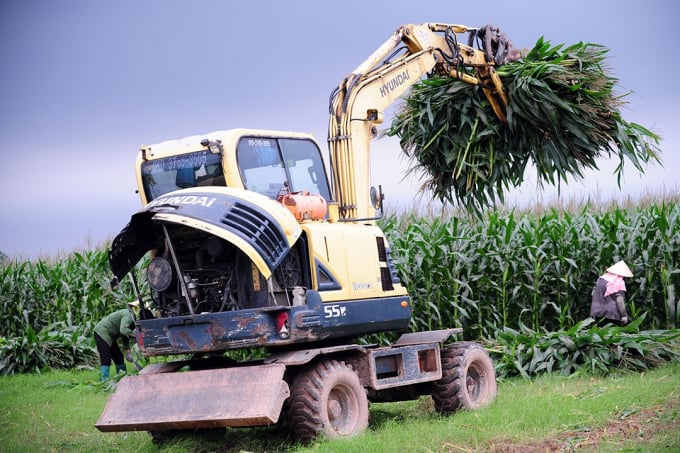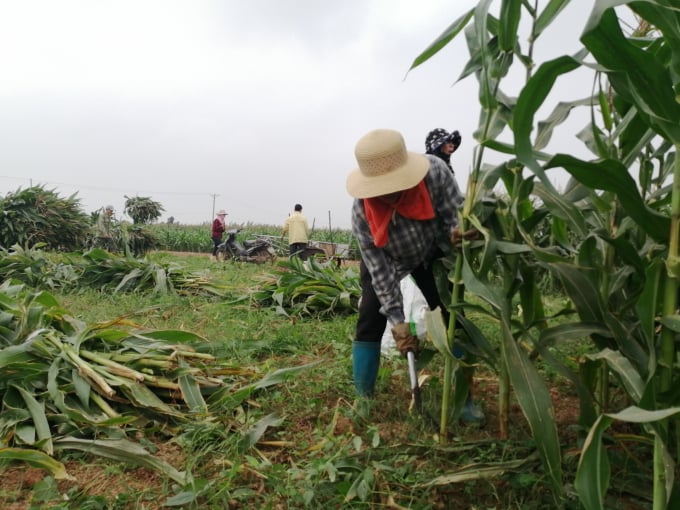May 30, 2025 | 06:53 GMT +7
May 30, 2025 | 06:53 GMT +7
Hotline: 0913.378.918
May 30, 2025 | 06:53 GMT +7
Hotline: 0913.378.918
On September 16, NAEC organizes a virtual conference titled "Promoting the maize production chain in winter 2021 in certain northern provinces" in collaboration with the Departments of Crop Production, Livestock Production, and Maize Research Institute.
It is attended by about 250 delegates, including farmers engaged in maize production in 12 northern provinces and cities, including Nghe An, Thanh Hoa, and Ha Noi, as well as representatives from many companies.
The forum's objective is to advance maize stover production in this year's winter crop by contributing to the establishment of maize stover production areas and guaranteeing sufficient quantity and quality to support sustained livestock improvement.
The delegates will discuss and share important experiences on efficient maize stover cultivation in light of the good outcomes obtained in 2020. Additionally, issues that remain unresolved in order to increase efficiency in the implementation of scientific and technological advancements, such as new maize varieties, are addressed and concrete solutions provided.
Additionally, the conference will include activities to assist farmers in connecting with companies that purchase biomass corn, ensuring steady production, and assisting farmers in improving economic efficiency.

Maize stover is expected to continue to acquire a new development push in the winter of 2021. Photo: TL.
In recent years, large-scale cow breeding has accelerated in our nation; specifically, growing high-quality dairy and beef cattle has been recognized as one of the most beneficial livestock products, providing livestock producers with great economic efficiency.
The nation will have about 2.3 million buffaloes, 5.9 million beef cattle, and 332,000 dairy cows by 2021. As a result, the need for fodder to feed big animals is very high in our nation, particularly during the dry season in the Central area and the harsh winter in the North.
With the goal of raising beef structure to 10% of total carcass structure, it is projected that the whole nation would need about 234,000 hectares of biomass maize (constantly producing all three crops per year) to satisfy fodder requirements.
To address the issues, the NAEC implemented a number of activities in 2020 to promote the development of maize stover production, including the following: organizing a conference with local governments and businesses to discuss solutions for expanding production and consumption of maize stover; capturing business consumption needs to inform local production plans; printing and disseminating leaflets providing technical information.

Maize stover is being expanded by farmers in the northern provinces, especially in the winter crop, because it has more advantages than corn for grain. Photo: TQ.
As a result, according to reports from businesses that purchase maize stover and a number of cattle farms in the North (Hoa Binh, Son La, Hanoi, Ha Nam...), the amount of maize stover used for cattle raising in the Northern provinces increased to between 280,000 and 300,000 tons in 2020 and is expected to reach between 380,000 and 400,000 tons in 2021. (at present it is estimated to reach nearly 300,000 tons).
The intimate connection between major livestock businesses such as Vinamilk, TH True Milk, T&T 159 Company, Greenlife Co., Ltd.... and the consumers of animal products has had a positive impact. By 2020, companies will have consumed over 400,000 tons of biomass maize, accounting for 100 percent of farmer production.
According to estimates, 1 ha of corn for stem takes 80-85 days to grow and yields 40-45 tons/ha/crop.
With a selling price of between VND 850,000 and 1 million dong per ton, farmers receive about VND 34-40 million after expenditures and profit of approximately VND 24-30 million per hectare each crop.
Thus, one hectare of maize stover may produce three harvests per year, enabling farmers to earn between VND 80 and 90 million per year, much more than other crops.
Translated by Linh Linh

(VAN) Ms. Nguyen Thi Dung, Deputy Director of Ngoc Hoang Cooperative, shared about the journey of bringing dragon fruit to Europe, achieving annual revenues in the billions of VND.

(VAN) Bamboo products from Thang Tho Bamboo Cooperative have reached many countries around the world, while also creating jobs for local workers.

(VAN) The Management Board of Con Dao National Park reported that a green sea turtle, tagged in the Philippines, has traveled thousands of kilometers to lay 84 eggs on Bay Canh Islet.

(VAN) Green technology is paving a new path for sustainable aquaculture in the Mekong Delta in particular and across the country in general, helping reduce emissions and adapt to climate change.

(VAN) On May 27, La French Tech Vietnam (the French startup and innovation community in Vietnam) held the French Tech Summit Vietnam 2025.
/2025/05/27/4731-2-223159_980.jpg)
(VAN) No votive paper, no styrofoam, no plastic bags, no plastic bottles, and no single-use plastic trays are the key rules tourists should keep in mind when visiting Con Dao.

(VAN) In the fight against plastic pollution, Vietnam has been demonstrating a proactive, pioneering, and active role in addressing the greatest environmental challenge today.